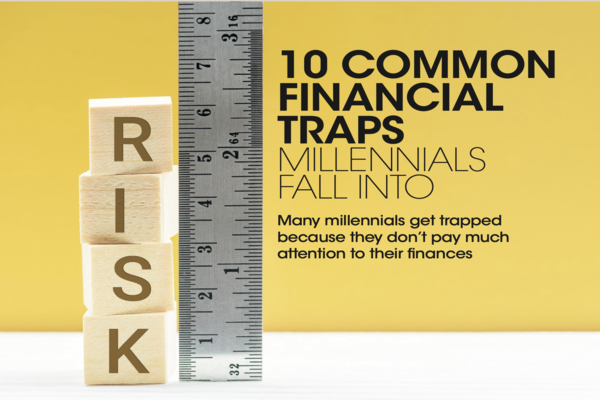
Don’t just plan to retire, retire with a plan
September 11, 2021
Can your financial plan survive the unplanned?
September 12, 2021Many millennials get trapped because they don’t pay much attention to their finances
Money doesn’t disappear overnight but often it’s the case of losing one dollar at a time. It may not seem like a big deal when you order a Mocha Frappuccino, have a dessert in a nice cafe or watching a long awaited movie, but every little item adds up in the long run.
Being a millennial as well as a licensed financial planner, there are many financial traps I’ve also succumbed to, and now would like to remind myself (and you too) to stay away from.
#1 INSTAGRAMMABLE LIFESTYLE
A cup of RM20 Coffee, a plate of RM30 Big Breakfast, a slice of RM20 cake — these are perfect elements to form a likeable photo, but these are also killing our bank accounts. When we chase a materialistic lifestyle, we might lose control of our finances.
#2 CRAZY SHOPPING WHEN THERE IS A SALE
Looking for SALE is an easy job in this e-commerce era. You might wonder why buying things on sale is an issue? This is because no matter how great the bargain, if you purchase something you aren’t going to use, you’re just throwing away your money!
Ask yourself, “Do I really need this and will I be using this frequently?” or “Am I just buying it because it’s on sale?”
#3 SUBSCRIPTION TRAP
The most common marketing strategy nowadays is to encourage consumers to sign up for a “free” trial. You only need to activate the trial by putting in your credit card details to enjoy the service.
The companies are hoping that people will forget to cancel, and then the monthly payments will just get charged to our account. And way toooften, that’s exactly what happens. This happened to me before, and probably has happened to you as well.
The effective way to avoid this is to ask ourselves: do we truly need things like movie subscriptions, music services or fancy gym memberships that keep us paying for months? Reconsider to see if there are cheaper ways of doing the same thing and if the subscriptions are necessary for you.
#4 FULL ALLOCATION OF SALARY WHILE PLANNING TO 'SAVE LATER'
RM300 for the latest flagship handphone, RM100 for a mobile plan, RM200 for a gym membership, RM1,000 for the dream car… who says millennials don’t plan for their finances? We have our monthly salary “100% well-allocated” into different expenses. However, we might just be forgetful about one thing: Savings.
The more we earn, the more we save? Unfortunately, it’s usually not the case. The first time I received my salary, I told myself to save up at least10% every month. One year passed, I was still saving the same amount even though my salary was up more than 10%. I thought it’s due to the market inflation, so I couldn’t save more. In the end, I realised it’s due to my own “Lifestyle Inflation”.
#5 USING CREDIT CARDS FOR DAILY EXPENSES
Don’t you feel it’s cool to just swipe a card/scan a code and get what you want? While we live in an era where cashless payments are unavoidable, but the credit card is not our only choice.
When you use your credit cards to cover the shortfalls in your spending, you can eventually run up a huge amount of debt. Besides, people tend to spend more when they are paying with credit cards. Don’t forget, you still have your debit card!
#6 MAKING FINANCIAL CHOICES OUT OF FOMO
Another common trap I face is to make a financial decision out of the fear of missing out (FOMO). When we are afraid, we might not consider all of the options available, and might end up making a costly mistake. Besides, millennials tend to have peer pressure to take a big financial step, from buying a new car to purchasing a home to getting married or having a child.
Just stop! Take a deep breath and think whether you are ready for these moves. Rushing to accomplish these might not benefit you financially.
#7 SIMPLY INVESTING AND CHASING QUICK GAINS
We are lucky as we have easy access to investment information compared to our parents. However, simply investing without knowledge, time anddiscipline can be a financial killer of our hard-earned money. I have seen some of my friends chase after quick huge gains from investments without paying attention to the risks involved.
It would be folly for us to buy a stock or a property and just pray that it would “go up” without careful analysis. If you have no time to do this, it’s advisable to engage experts tohelp you instead.
#8 THINKING WE WILL BE FOREVER YOUNG
Many young Malaysians don’t even think about retirement:
• In our 20s, we think retirement is far away, YOLO!
• In our 30s, we enter a different life stage, buying a house, getting married, etc, and often we lack funds to save for the future.
• In our 40s, we need to provide more for the family, e.g. children’s education fund.
Commonly but sadly, people only recognise their retirement needs in their 50s, which is probably already too late. A warm reminder: the youngest millennials are already 24 years old now, and the eldest are already 39 years old.
Another major misconception many of us have is that we choose not to buy insurance in order to save money. But this isn’t a wise financial decision. What makes a millennial so confident to think we are risk-proof from medical conditions or personal accidents?
#9 TRAVEL PLANS ARE DONE! HOW ABOUT YOUR FINANCIAL PLAN?
Planning for travel is always in our top bucket list, but how about our own financial plan? We spend countless hours scrolling through social media feeds, spend thousands of ringgit on getting the latest gadgets, but setting aside two hours to engage the services of a professional to plan our finances is rarely in the plan.
We need this “financial Waze” to lead us towards our financial goals in life. Without a financial plan, our financial future is unsecured as we are uncertain what is going on right now and where we are heading to.
#10 WE DON'T ASK FOR HELP AND CHOOSE TO IGNORE
I don’t mean you should borrow money from your friends or relatives. However, most of us will be facing financial problems that we can’t handle well, for example budgeting problems or major financial decisions to make. Don’t try to adopt an “ostrich policy” and pray the problems would resolved by itself.
Many of us get trapped because we don’t pay much attention to our finances. Every month we receive our pay cheque, pay the bills, and thenspend what’s left (if there’s anything). I understand that money is a taboo subject and we feel ashamed when we’re struggling. But there is so much help out there! Tell someone you trust or talk to a licensed financial planner to let them guide you.
It is important to have an informed financial plan that can help us millennials achieve financial success. Remember, managing your finance is managing your life.
Starting by monitoring all the seemingly small expenses. Think carefully before adding new debt, and keep in mind that being able to make a payment (swiping your credit card) isn’t the same as being able to afford the purchase. Don’t fulfil your current desire by sacrificing your future funds.
If you make saving a monthly priority and get the help from a licensed financial planner to work out your plan, you are more likely to enjoy life more abundantly.
If you’ve spent time to finish reading this, take charge of your life by taking charge of your finances now. Have your personalised financial plan today!
First published in Smart Investor 11/12, 2020 Issue

Ocean Pon
Licensed Financial Planner with Finwealth Management Sdn Bhd




